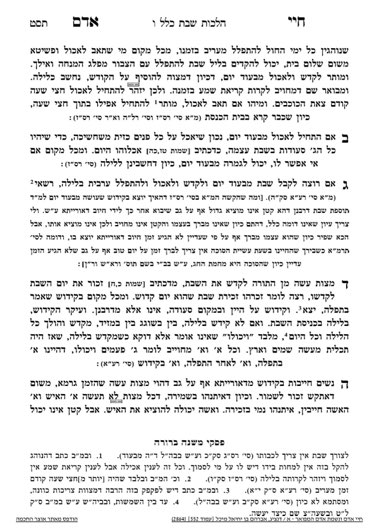The current series, which will cover Maariv on Friday night and Kiddush, is available for sponsorship. Please contact Rabbi Reingold for more information.
We are continuing in siman 2, where the Chayei Adam is discussing davening maariv before tzeis hakochavim on Friday night. The Chayei Adam began by referencing Klal 34, which is the general halachos of maariv. There, he mentions a point which is not mentioned here. In siman 8, he writes that even one who is careful to daven after tzeis in general can be lenient and daven early on Friday night. One must still make sure to recite kriyas shema after tzeis, not to begin a meal within 30 minutes of tzeis, and that one may be meikil if it is difficult for them to wait. These points are all parallel to what he writes here. He does point out that if one begins the meal, relying on the opinion of Rabbeinu Tam which we learned yesterday, they should still repeat kriyas shema after tzeis, since the vast majority of rishonim do not agree with Rabbeinu Tam.
Then, he adds a point which he does not discuss over here, regarding tarti desasri. The Gemara has a machlokes between Rebbi Yehuda and the Chachomim regarding when the zman of mincha ends and when the zman of maariv begins. According to the Chachomim, the zman of mincha ends at nighttime, and then the zman of maariv begins afterwards. According to Rebbi Yehuda, the zman of mincha ends at plag hamincha, and the zman of maariv begins afterwards. As we learned in the previous shiur, although it is not necessarily night outside, it is the beginning of the evening. According to Rebbi Yehuda, one cannot daven mincha after plag hamincha, and according to the Chachomim, one can daven mincha until tzeis hakochavim (which, practically, is a safeik, and therefore we try to daven before the zman safeik begins, i.e., before shkia).
The Gemara concludes that there is no final psak in this machlokes, so whichever opinion one follows, they have what to rely upon. However, when the poskim bring down this halacha, they say that one cannot do a contradiction in terms, meaning, they cannot daven mincha after plag (relying on the Chachomim) and then maariv before tzeis (relying on Rebbi Yehuda). The Mishnah Berurah understands that the issue of tarti desasri not only applies to the same day (I.e., doing both Mincha and Maariv in the same time unit), but one should not follow Rebbi Yehuda on one day, and the Chachomim on another.
It comes out that one should not be able to daven mincha right before shkia and maariv right afterwards, as mincha would be after plag, and maariv would be before tzeis. Even though it is after shkia, the zman for maariv is with tzeis hakochavim, and the time immediately after shkia is a safeik. The minhag of many communities to daven mincha and maariv back to back relies on the reality that it is not feasible to bring the tzibbur back together for maariv at a later time, hence it is a shaas hadchak.
When it comes to Friday night, we have a potential tarti desasri if one were to daven mincha after plag and then accept Shabbos and daven maariv immediately thereafter. Therefore, he writes that one who is planning to make early shabbos should definitely be makpid to daven mincha before plag, and maariv after.
The Mishnah Berurah, at the beginning of siman 267, writes that there may be arguments to be meikil, since it is a tzibbur, and it will be difficult for the tzibbur to regroup. Either way, the Mishnah Berurah writes that one should only be meikil if they at least daven maariv after shkia. However, the sefer Derech Hachaim, written by the Nesivos, writes that one can daven maariv before shkia even though he has davened Mincha after plag and even though it appears to be a tarti desasri. He explains that it is not a tarti desasri, because once a person accepts Shabbos, they have made it as though it is nighttime, so it is no longer the same time period. Many rely on the Derech Hachaim, but the Mishnah Berurah does not like this leniency.
Some minyanim rely on the plag calculated according to the Magen Avraham, who holds that the halachic day is calculated from alos to tzeis, which makes plag much later. Thus, one ends up davening mincha before the plag of the Magen Avraham, and maariv afterwards.
We see there are many minyanim which rely on the Derech Hachaim, but we see that the Mishnah Berurah is not happy about it, limiting his kula to when maariv is davened after shkiah, and the Chayei Adam does not mention any leniency at all. Therefore, one should try to daven mincha before plag.
Summary
When making early Shabbos, one should try to daven mincha before plag in order to avoid a tarti desasri. However, if one is unable to, they have what to rely upon.



